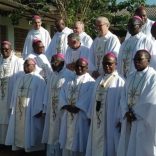Adapting to climate change, opportunities for young people and cultural exchange: German ...
Attacks: Parents in the centre of Mozambique take children out of school to keep them safe

Many parents in the centre of the country, a region plagued by armed attacks which have already killed 21 people since August, are choosing to take their children out of school in order to keep them safe.
“I sent my three children to my brother’s house in Chimoio, because I have no way of keeping them safe here, with these attacks,” Albino Nhampenza, a farmer who lives in the village of Pindanganga, says. “I prefer them to be safe rather than study.”
He himself leaves his house in the village to spend the nights in the woods, for fear of possible armed incursions.
Elsa Francisco, a student at Escola Completa de Pindanganga, has not been back to school since losing a classmate in an attack on public transport in Gondola on November 6.
“There is no security there, and they promised to attack schools at the beginning of term,” she tells Lusa, adding that her parents are considering sending her to school in Chimoio.
Elsewhere, the only school in Munhenga, a village with about 400 inhabitants, remained closed with grass growing in the halls just before the official start of the school year on Tuesday, February 4.
The school belongs to the Pindanganga Pedagogical Influence Zone, one of the areas known to Manica education authorities as having the lowest enrolment rate for students, because of the attacks.
There is a risk that some schools will not reopen after the long December holidays.
“We don’t have the students to start classes,” teacher Chirinza Taimo tells Lusa. He says that many students left the area when attacks intensified just before the end of 2019.
“The students and their parents fled the attacks and never came back,” he says.
Former Mozambican National Resistance (Renamo) guerrillas have kept the area in a state of agitation since August, contesting the terms of the peace agreement between the main opposition party and the government. Attacks in the region have killed civilians on the roads and villages.
Statistics from the Provincial Directorate of Education and Human Development of Manica indicate that 2,000 students from five primary schools in the attack zones have failed to enrol because of insecurity affecting Muda Serração, Chibuto I, Chibuto II and Pindanganga, in the interior of the Gondola district.
Gondola district enrolled only 3,500 students out of the 10,500 expected Grade 1 pupils this school year. Parents “are afraid” to send their children to school, provincial directorate spokesman João Tricano says.
“We instructed [schools] to identify where the children went, where they took refuge, and if there are schools there where they can enrol so that, when the environment normalises, they can come back and return to their schools of origin,” he adds.
Some communities are already returning, seeing that the Defence and Security Forces are present “to guarantee the permanence and security of the communities”, João Tricano says.
A dozen kilometres from Munhenga, the Pindanganga Primary School will start the school year with 78 students fewer than its 2020 goal of 130.
“Some parents are still absent, but we hope that they will return any time now and improve our performance,” school director Luís Gua told Lusa.
The mass flight of the population in the district of Gondola began in October, when attacks intensified on villages and vehicles on minor roads and along the N6, the main road corridor linking the port of Beira and the Indian Ocean to Zimbabwe and other hinterland countries.
But according to reports in Gondola, which borders the districts of Gorongosa to the north and Chibabava to the south, several homes have been set on fire in recent weeks, further complicating the matter of the population’s return.
Another Pindanganga resident, Josefa Maia, has nowhere to send his children to study and his only option is to keep them at home to protect them from the threat of attacks at the start of the school year.
“My whole family was born and lives here. I have no relatives elsewhere to send my children to,” he says.
The Ministry of Education and Human Development of Mozambique will have 8.4 million students in the new academic year, an increase of 4.7% compared to 2019.
The ministry expected to hire 12,894 teachers, but financial constraints will allow it to take on only half this number. It hopes to make up the deficit as soon as there is money from the Ministry of Economy and Finance, reducing the current teacher-pupil ratio from 65 to 62.
ALSO READ: Nyusi calls for inclusive and quality education













Leave a Reply
Be the First to Comment!
You must be logged in to post a comment.
You must be logged in to post a comment.